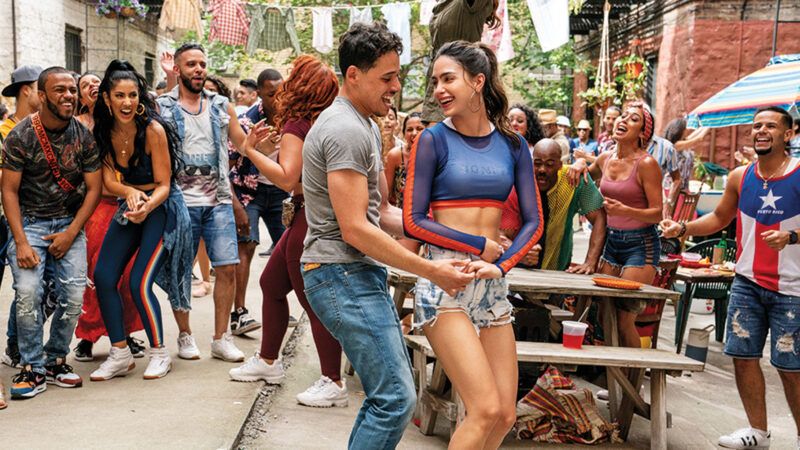In the Heights Is a Charming Musical About Immigration and Entrepreneurship
Even a critic who doesn’t love singing or dancing succumbed to its charms.

I have a confession to make. I have never seen Hamilton. Indeed, not only have I never seen Hamilton, I do not particularly care for most musicals (with a few notable exceptions), or dancing, or stage-style bare-your-soul, explain-your-thoughts singing. Nothing that matters in life or in movies should ever be resolved by singing or dancing. Fictional characters should work out their internal issues and external conflicts in normal and relatable ways, with terse monologues, glowering stares, and elaborately choreographed action scenes.
So when it comes to the musical art form and all its trappings, I admit to being what you might call a curmudgeon, which a long way of saying that I am very much not the target for In the Heights, the new movie musical from Hamilton scribe Lin Manuel Miranda and Step Up 2: The Streets director Jon M. Chu. This movie isn't for me. Or at least it shouldn't be.
And yet, somehow, I found it rather charming, even heartwarming. I don't know if it's a great movie, but it's a gentle and genuinely appealing production, buoyed by a message of DIY community building and entrepreneurial advancement.
Some of that charm is a product of Chu's deft direction, which takes the choreographed song spectacles of the stage musical, which debuted in 2005, and transforms them into a series of decidedly cinematic sequences. A few of these songs produce big numbers with ambitious designs and dozens of extras. But some of the film's best bits are smaller, more intimate, as Chu recasts the rhythms of everyday life—walking down the street, stamping prices on food cans at a small corner market—into cleverly edited bits of musical cinema.
Much of the film's success owes to its genuinely appealing cast, in particular, Anthony Ramos as Usnavi de la Vega and Melissa Barrera as his (maybe) love interest, Vanessa. Both deliver wholehearted performances that manage to be deeply earnest without ever quite coming across as cheeseball.
That earnestness, in turn, is what fuels the story's big themes and values, which revolve around entrepreneurship, immigration, and self-made communities. In the Heights is set in the heavily Dominican New York City neighborhood of Washington Heights, and it is, at heart, the story of an immigrant community coming together to determine its own future.
Sometimes that future is forged by fighting with a labyrinthine immigration bureaucracy and racist attitudes, and there's an admittedly too-on-the-nose subplot about DREAMers that wasn't present in the stage version. But politics are only part of the story. By and large, In the Heights casts immigration as an entrepreneurial act, an individual decision to build a better life in concert with one's new neighbors.
So it is fitting that, as often as not, the community's future is forged through commerce. The plot runs through Usnavi's neighborhood bodega, but there's also a salon and gathering place run by two neighborhood women, a taxi dispatch, run by another local, Kevin Rosario (played with delightful ease and gravitas by Jimmy Smits), a local lawyer who handles tough immigration cases, and even a piragua (Puerto Rican shaved ice) cart run by a character played by Lin-Manuel Miranda.
These businesses are consistently portrayed both as sources of hard-earned personal wealth and valuable social connection, especially when the neighborhood faces a crisis, in the form of a citywide power outage, late in the second act. Charging people money in exchange for useful services—and keeping those services going when times are tough—is how they make their own lives better, and also how they help their neighbors. Their lives are improved, and their local universe is a better place, when their businesses grow.
The movie doesn't quite bang you over the head with this message, but it's not exactly subtle, either: The final, post-credits scene shows Miranda's street-cart piraguas becoming a hot commodity with the block's residents. In response to rising demand, he raises prices, and in the process, he outcompetes the Mister Softee truck that had been his biggest rival. (Mister Softee responds not with anger but with grudging respect.) It's an entrepreneurial immigrant success story, and a fitting grace note for a movie that earnestly, ebulliently celebrates such values—albeit through people who spontaneously break out in song and dance to share their feelings. Huh. Maybe I do like musicals after all.


Show Comments (37)